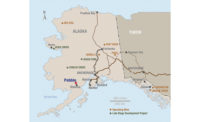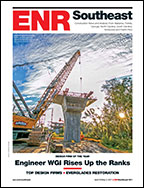
The Pebble Partnership is searching for another key investor to help fund its proposed Pebble Mine project in Bristol Bay, Alaska after international mining giant Rio Tinto gifted to two Alaska charities its 19.1% stake in the firm. A project spokesman says development of the mine, valued at $7 billion to $8 billion, will continue.
Environmentalists oppose the mine, which would potentially include a large earthen dam and a containment pond to store up "tailings" waste from the gold, copper and molybdenum extracted. The project would sit atop the headwaters of two key rivers in Alaska that feed into Bristol Bay, home to one of the world's largest sockeye-salmon fisheries.
"By giving our shares to two respected Alaskan charities, we are ensuring that Alaskans will have a say in Pebble's future development and that any economic benefit supports Alaska's ability to attract investment that creates jobs," said Rio Tinto's CEO Jean-Sebastien Jacques in a statement. A company spokeswoman says the project's uncertain time line was a contributing factor in the firm's decision to pull out. But "we remain very optimistic," says a mine project spokesman.
The project has faced a series of setbacks. In January, the U.S. Environmental Protection Agency released a report that concluded the mine could have a devastating effect on salmon habitat. On Feb. 28, the agency initiated a process that could result in a project veto under Clean Water Act permit rules. The year-long process involves, among other things, consulting with project developers and the U.S. Army Corps of Engineers as well as a public comment and review period. Until the process is completed, the Corps cannot approve a permit for the mine, and no National Environmental Policy Act (NEPA) reviews can be undertaken.
At an April 9 Senate hearing, EPA Administrator Gina McCarthy defended her agency's action. She said EPA was petitioned by local tribes to begin the review. "We felt it was worthy of a unique response … to get to these issues more quickly, given the uncertainty that is created for the tribes, the region and the economy," she said, adding, "We have not made any decision."
But Luke Popovich, vice president of the National Mining Association, notes, "It's a very clever way of saying it's not going to pass muster. I think they are completely transparent about this. There's no question—they don't want this mine."
The mine-project spokesman calls EPA's decision to initiate the Clean Water Act process an example of "unprecedented federal overreach." He says, "A lot of specificity that [EPA is] seeking is what the agency could expect to see in the permitting process. …There's absolutely no harm in letting the NEPA process move forward."




